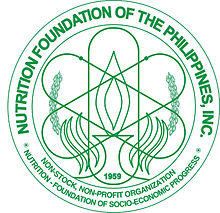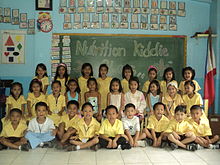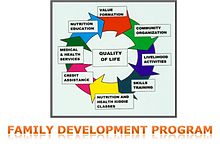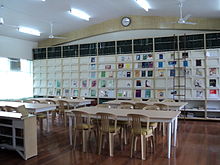- Nutrition Foundation of the Philippines, Inc.
-
The Nutrition Foundation of the Philippines, Inc. (NFP) is a Philippine private, non-stock, non-profit organization engaged in improving the nutritional status of the Filipino community. The NFP was founded by National Scientist, Dr. Juan Salcedo, Jr.
In 1950, Dr. Juan Salcedo Jr. was appointed the first Director of the newly created Institute of Nutrition, as the “clearing house of information relevant to human Nutrition”. Later, the Institute was developed into a Research Center, the Food and Nutrition Research Center. Thus, arose the need for an agency that would translate the findings of the Center into practical terms for the improvement of the nutrition of the people. The slogan at the time was “Nutrition is everybody’s concern”. It was felt that a private organization that would support the government efforts would give meaning to the slogan, thus the birth of the Nutrition Foundation of the Philippines in December 28, 1959, registered at the Securities and Exchange Commission on January 18, 1960, and formally started its operation on July 15, 1960.
The Foundation was conceived to promote nutrition in the Philippines, as an important factor in improving the health of the people and ultimately of the welfare and economic life of the community. During the early years, NFP’s thrust was the provision of direct technical field service to individuals and groups, particularly in low income communities where malnutrition was prevalent; organization of nutrition councils (the forerunner of today’s nutrition committees) which serves as the organizational structure for the delivery of coordinated nutrition services in the communities; and the provision of grants-in-aid to institution and individuals for study and research purposes.
Through the years, direct field services occupied a significant part of NFP’s regular activities. In the 80s, the NFP shifted its efforts from directly carrying out specific field projects to conduct of training program, development of IEC materials geared to the grassroots, the maintenance of its library facilities and provision of consultation services to organized groups in nutrition.
“Quality life for the Filipinos through nutrition” is the vision of the Nutrition Foundation of the Philippines; and its mission is to develop programs and services that will improve the nutritional status of the Filipinos particularly through nutrition education.
Objectives
- To promote awareness and practice of nutrition principles through a campaign directed at the public in general and the vulnerable groups in particular
- To increase manpower resources for community nutrition work through depth training programs
- To develop a pool of resource persons through staff development programs
- To develop/improve techniques and approaches to nutrition education through applied research
- To assist/cooperate with government and private agencies involved in nutrition work.
Nutritional and health programs
The NFP is known for various nutrition programs. Their Nutrition and Health Kiddie Class program which aims to educate children, aged four to six, about the importance of food and nutrition. They have also implemented the Urban Family Development Program in 1991 to improve the nutritional status of depressed urban families through livelihood assistance and health and nutrition classes and services.
Nutrition and Health Kiddie Class (NHKC)
The Nutrition and Health Kiddie Class is conceptualized for pre-school children to acquire knowledge on food and nutrition that will enable them to: Learn the importance of food in relation to health; know the various nutrients needed by the body and its sources; practice personal hygiene; be an advocate of environmental sanitation; help improve their nutritional and health status.
A unique feature of the NHKC is the participation of the volunteer teachers who handle all the classes without any compensation. Usually, they are mothers or youth from the community/ barangay who are trained to teach the preschool aged 4–6 years. They are called “MOTHER COORDINATORS (MCs) or NUTRITION YOUTH COORDINATORS (NYCs)”, respectively. The NHKC follows the school calendar, from June of the current year till March of succeeding year. Classes are held daily or 2-3 times a week, depending on the community. A session lasts for 2 hours.
The NHKC has a specific curriculum and modules developed though the years by the “teachers” and NFP staff. Topics included in the module are: food and nutrition, personal hygiene, environmental sanitation, growth monitoring, food production, micronutrient etc. Likewise, the basic 3R’s of reading, writing, and arithmetic are discussed in the context of nutrition.
Strategies used includes lecture-discussion, story telling, songs, games, film showing, field trips, and work exercises are employed to make the learning interesting and easy-to-understand. The NHKC has a supplementary feeding component. Primarily, the feeding aims to show the child and their mothers on how to feed them properly and to internalize the topics/subjects taught in the NHKC. Foods served are nutritious, easy -to -prepare and economical, which can also be prepared and served at home for the rest of the family members. The marketing, preparation, and cooking are done by the mothers of the children for the supplementary feeding sessions.
Family Development Program (FDP)
This is one of the major activities of the Foundation that focus on the development of the family members to be responsible for the betterment of their health and ultimately improving the quality of their lives through: conscious recognition of each and everyone’s responsibility to themselves, family and community; providing opportunities and support to augment regular income through learning of some income generating activities, improved health and nutrition condition of their families through the implementation of some direct nutrition intervention activities; and developing skills in the implementation and management of community nutrition project and related activities. Some of its components include the following:
Value Formation
NFP promotes activities that help individuals realize his value and potentials towards the development of the communities where he lived. It is the main goal of this program to make people realize a very important role he is to play for the success of their plans for the benefit of the community.
Community Organization
NFP helps organize the communities and facilitates group dynamics, teambuilding activities and programs designed to promote camaraderie, teamwork, and cooperation among the people. Yearly program planning and evaluation focusing on problems encountered in the program implementation is also regularly conducted.
Leadership Trainings
NFP facilitates trainings for informal leaders of the community, barangay health workers, barangay nutrition scholars, out of school youths, mothers and other interested groups who needs specific related trainings.
Nutrition Education
Series of nutrition classes are given to various groups in the communities to provide them knowledge on health and nutrition. Topics discussed include: the basic food groups, meal planning and food preparation, food safety, utilization of edible wastes, nutrition in the life cycle, environmental sanitation, food fortification, livelihood opportunities, and nutrition in disease. Various methodologies such as role-playing, workshops, games, and cooking demonstrations are utilized to make the class interactive and participative.
Medical, Dental, and Nutrition Services
In cooperation with the local health centers or district health units- medical, dental, and nutrition services are conducted. A team of doctors, dentists, nutritionists, and barangay health worker goes around the puroks of the barangay, on a regular schedule, to render services such as deworming, regular weighing, and dietary counseling.
Currently, the FDP is being undertaken in communities of Quezon City namely – Brgy. Santol, Brgy. Doña Imelda, Sitios Kaingin I, Kaingin II, and Proper of Brgy. Pansol and Sitios Chamberette, Mary Town, Park 7, and Daan-Tubo of Brgy. Loyola Heights; Tondo, Manila, and in the whole Municipality of Alaminos, Laguna.
Dr. Juan Salcedo, Jr. Memorial Lecture
This activity is regularly conducted by the Foundation as a way of honoring Dr. Juan Salcedo, Jr., its founder. He was a National Scientist and Academician, former Secretary of the Department of Health and Chairman of the National Science Development Board and dubbed as the “Father of Philippine Nutrition”. This is also a way to give recognition to experts in the field of nutrition and public health to share current trends in nutrition. The participants of this activity are, composed mostly of nutritionist-dieticians, health workers and heads of various nutrition and health organizations, both from the government and private sectors. In the past years, the Foundation invited speakers who discussed topics on: “Collaboration and Institutional Development, The Politics of International Nutrition; Nutritional Repercussions of Developmental Transition; Perspectives and Challenges in Nutrition in the Philippines; Cancer and You; Management of Nutrition Programs by Local Executives; Infant and Young Child Nutrition; Coconut Oil and Cardio-Vascular Diseases, and Strategies in the Prevention and Management of Hidden Hungers”.
Undergraduate Training in Public Health and Community Nutrition
This type of training exposes the senior nutrition students of the different colleges / universities in Metro Manila to the communities, where they could acquire skills and knowledge program planning and implementation, monitoring and evaluation. Basically, they are also provided inputs on community organizing, mobilizing and participation particularly relating to health and nutrition activities that will benefit the families in particular and the communities in general.
It is offered every first quarter of the year covering a total of 240 hours, as required by the nutrition curriculum approved by the Commission on Higher Education.
Residency Training in Public Health and Community Nutrition
It aims to develop a pool of trained manpower in community nutrition. This training is offered to nutrition graduates who are interested to pursue public health and community nutrition work. The training covers a period of 4 months and is being offered on the third quarter of each year to qualified nutritionist-dietitians. Each trainee will be given specific assignments or projects to undertake, under the supervision of an NFP nutritionist. The trainees receive a modest daily stipend for the duration of their training.
Nutrition Networking
Another way of ensuring effectiveness in the use of scarce resources is by networking and coordinating with the different agencies that aim and work with a common objective. This program is done mainly through cooperative services with GOs and NGOs in the country as well as international agencies/organizations; membership in working committees/advocacy groups; provision of resource persons/speakers; and consultation services.
For a number of years, NFP has been the Philippines Adhering body of the International Union of Nutrition Sciences (IUNS). Likewise, it has maintained linkages with other international agencies such as the Federation of Asian Nutrition Societies (FANS), UNICEF, International Food Policy Research Institute, Helen Keller International and the World Health Organization.
Library and Reference Services Program
A significant aspect in the nutrition promotion and information activity of the NFP is the establishment of a library which serves both professionals and student groups. The E.O. Carrasco Memorial Library is a specialized library which at present maintains a subscription of 18 foreign journals and 43 foreign titles on foods and nutrition in addition to books among its acquisitions. It also maintains a reference service link-up with other technical libraries in Metro Manila through the NUTRINET (Nutrition Research and Information Network).
Publications
As a part of the Foundation’s nutrition information and education campaign, some publications are made to promote nutritional awareness to the people. The Bulletin of the Nutrition Foundation of the Philippines is the official publication/ newsletter of the Foundation It is being published quarterly and features articles on current nutrition issues and serves as a vehicle in the mass dissemination of nutrition information, particularly to the professionals. Teka, Teka, Teka… Lutuing Naiiba is a recipe book containing 51 standardized recipes that utilizes edible food wastes such as banana, squash, and carrot peelings; soy precipitates, coconut meal, langka seeds, and many others. Kitchen Tested Recipes for Preschoolers, a recipe book intended for the implementation of self-help supplementary feeding programs in the community for preschoolers. The actual nutrition contribution of each recipe is shown in bar graphs for better understanding. Recipes for Daily Living, is a recipe book developed in response to the clamor for economical and easy-to-prepare but nutritious foods. It targets the housewives who are on the lookout for preparing and serving meals that are palatable, nutritious, convenient, and economical. Another publication is the Low Fat and Low Cholesterol Cookbook. The cookbook is a compilation of tested modified recipes, indicating specific calories, protein, fat, and cholesterol content of each recipe. This is to help the public find immediate action in preventive and curative aspects particularly for those suffering with cardiovascular diseases, diabetes and other degenerative diseases. Likewise, people who are overweight and obese can benefit from this recipe book.
Official Website (Under Construction)
Temporary Website
External Links
Categories:- Non-profit organizations based in the Philippines
- Humanitarian aid organizations
- Advocacy groups
- Philippine culture
- Philippines stubs
Wikimedia Foundation. 2010.







